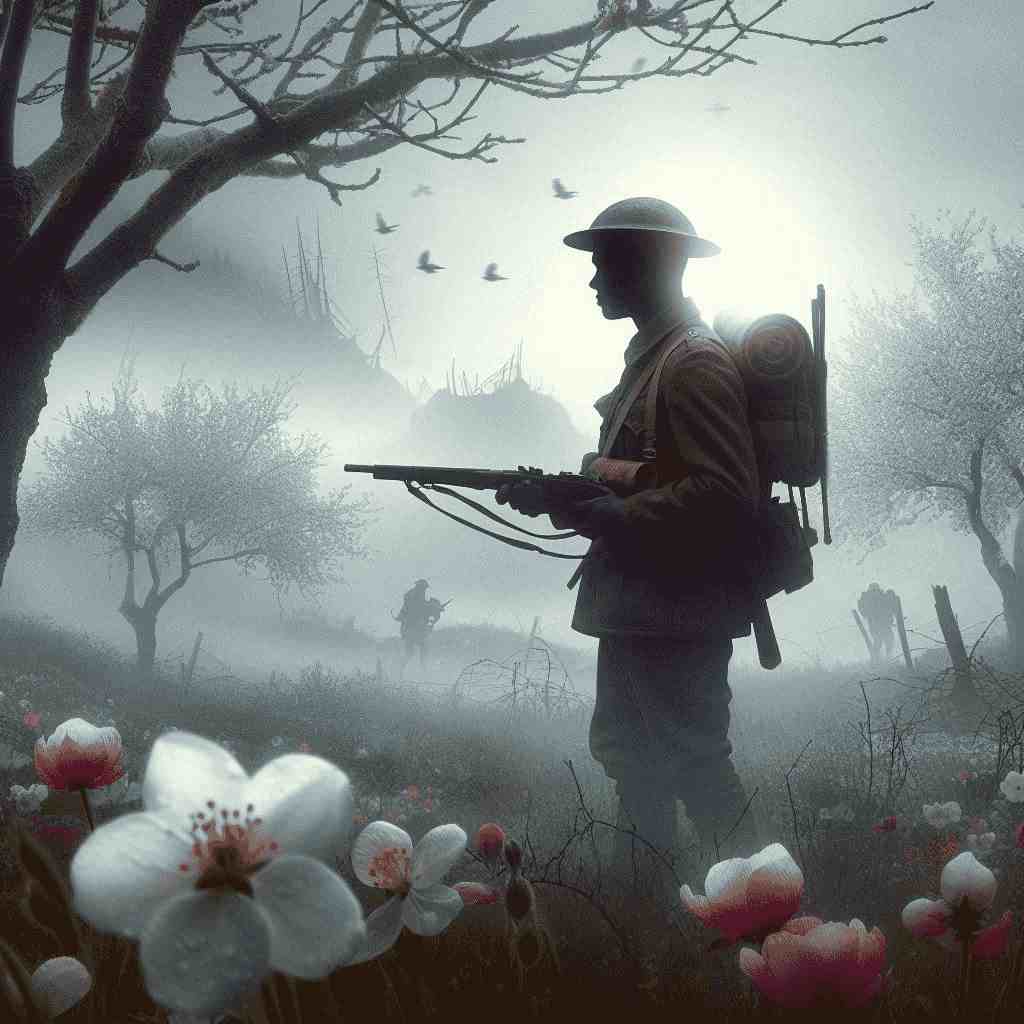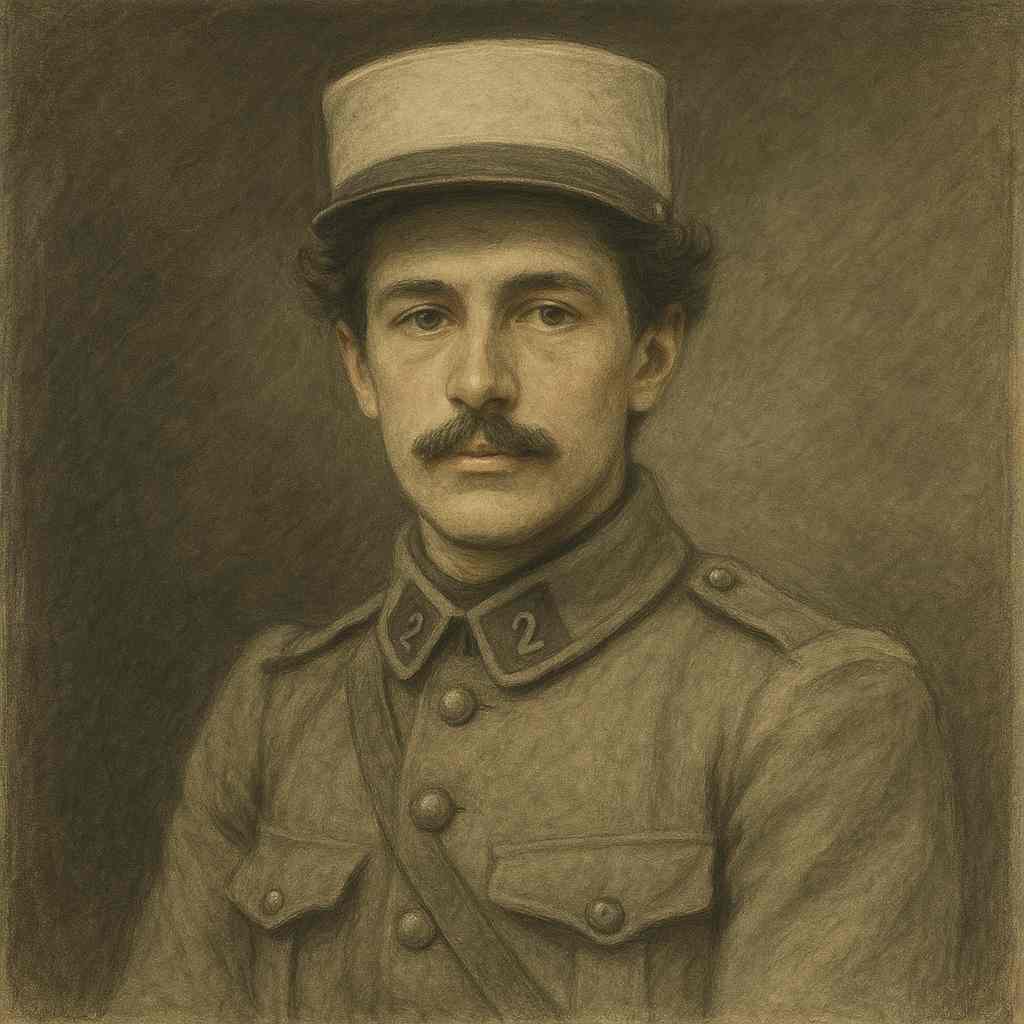I Have a Rendezvous with Death
Alan Seeger
1888 to 1916

I have a rendezvous with Death
At some disputed barricade,
When Spring comes back with rustling shade
And apple-blossoms fill the air—
I have a rendezvous with Death
When Spring brings back blue days and fair.
It may be he shall take my hand
And lead me into his dark land
And close my eyes and quench my breath—
It may be I shall pass him still.
I have a rendezvous with Death
On some scarred slope of battered hill,
When Spring comes round again this year
And the first meadow-flowers appear.
God knows ’twere better to be deep
Pillowed in silk and scented down,
Where Love throbs out in blissful sleep,
Pulse nigh to pulse, and breath to breath,
Where hushed awakenings are dear …
But I’ve a rendezvous with Death
At midnight in some flaming town,
When Spring trips north again this year,
And I to my pledged word am true,
I shall not fail that rendezvous.
Alan Seeger's I Have a Rendezvous with Death
Alan Seeger's poem "I Have a Rendezvous with Death" is a poignant exploration of mortality, duty, and the stark contrast between the beauty of life and the inevitability of death. Written during World War I, the poem reflects Seeger's experiences as a soldier and his prescient understanding of his likely fate. Through its vivid imagery and recurring motifs, the poem creates a haunting juxtaposition between the renewal of spring and the finality of death.
The poem's structure is notable for its use of repetition, particularly the phrase "I have a rendezvous with Death," which appears three times. This repetition serves to emphasize the speaker's acceptance of his fate and the inescapable nature of death in wartime. The repeated mention of spring throughout the poem creates a powerful contrast between the cyclical nature of the seasons and the abrupt ending of a human life. This juxtaposition is particularly striking in lines such as "When Spring comes back with rustling shade / And apple-blossoms fill the air," where the idyllic imagery of nature's rebirth is set against the looming presence of death.
Seeger's use of personification in portraying Death as an entity with whom the speaker has an appointment adds a sense of formality and inevitability to the poem. The phrase "rendezvous with Death" suggests a predetermined meeting, implying that the speaker views his potential demise not as a random occurrence but as a fated encounter. This personification continues throughout the poem, with Death being described as potentially taking the speaker's hand and leading him into "his dark land."
The poem's tone shifts between resignation and a hint of hope. While the speaker seems to accept the likelihood of his death, there is a subtle suggestion of possible survival in the line "It may be I shall pass him still." This momentary glimpse of hope adds depth to the speaker's character, showing that while he is prepared for death, he has not entirely abandoned the possibility of life.
The imagery of war is present throughout the poem, though it is often subtle. References to "disputed barricade," "scarred slope of battered hill," and "some flaming town" paint a vivid picture of the war-torn landscape without dwelling on explicit descriptions of violence. This approach allows Seeger to convey the reality of war while maintaining a focus on the speaker's internal struggle and acceptance of his potential fate.
In the third stanza, Seeger introduces a contrast between the soldier's current situation and an alternative life of comfort and love. The lines "God knows 'twere better to be deep / Pillowed in silk and scented down, / Where Love throbs out in blissful sleep" present a sensual and peaceful image that stands in stark opposition to the harsh realities of war. This juxtaposition serves to highlight the sacrifice made by soldiers, who forsake comfort and potential happiness for duty.
The poem's final stanza reaffirms the speaker's commitment to his duty, despite the allure of a more comfortable life. The line "And I to my pledged word am true" emphasizes the speaker's sense of honor and dedication to his cause. The poem concludes with a powerful statement of resolve: "I shall not fail that rendezvous." This ending underscores the speaker's acceptance of his fate and his determination to face it with courage.
Seeger's use of rhythm and rhyme contributes to the poem's musical quality and adds to its emotional impact. The regular rhyme scheme and meter create a sense of inevitability that mirrors the poem's theme, while occasional variations in the rhythm reflect the uncertainty and turmoil of war.
In conclusion, "I Have a Rendezvous with Death" is a masterful exploration of mortality, duty, and sacrifice in the context of war. Through its vivid imagery, powerful contrasts, and nuanced portrayal of a soldier's mindset, Seeger creates a poem that resonates with readers long after its final line. The work stands as a testament to the human capacity for courage in the face of death and serves as a poignant reminder of the personal costs of war.
This text was generated by AI and is for reference only. Learn more
Want to join the discussion? Reopen or create a unique username to comment. No personal details required!



Comments
No comments yet. Be the first to comment!